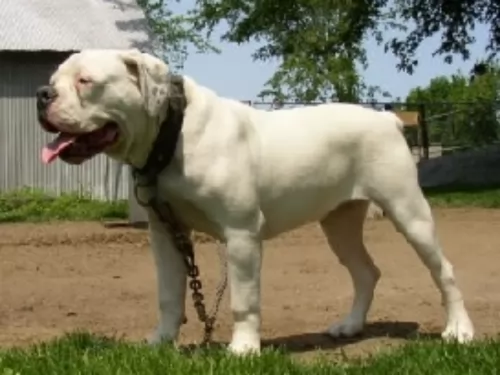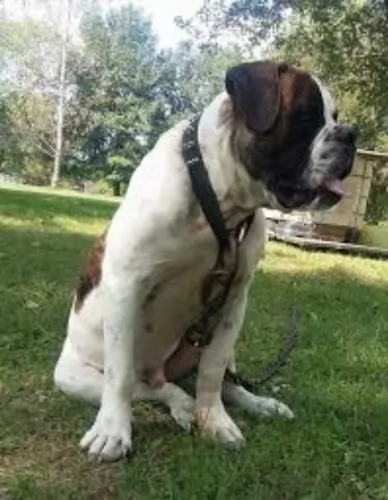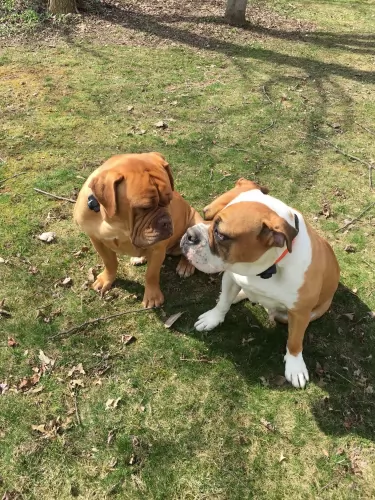 Petzlover
PetzloverBilly is originated from France but Hermes Bulldogge is originated from United States. Both Billy and Hermes Bulldogge are having almost same height. Billy may weigh 36 kg / 79 pounds lesser than Hermes Bulldogge. Both Billy and Hermes Bulldogge has same life span. Billy may have less litter size than Hermes Bulldogge. Billy requires Moderate Maintenance. But Hermes Bulldogge requires Low Maintenance
The Billy (or Billie) Dog is a rare breed developed in France and mostly still only found in France. Created in the 19th century by Monsieur Gaston Hublot de Rivault and named after his home, Chateau de Billy, he is hunting dog of high quality. The Billy dog was developed by crossing the Poitevin’s original three lines – the Larrye, the Ceris and the Montemboeuf. In developing the Billy, Rivault favored the colors found in the Ceris and Montemboeuf strains as opposed to the tricolors of the Larrye strain. The Billy is a scent hound from all the lines leading back to the monks of the Saint Hubert Monastery in the middle ages, in Belgium, then refined in Gaul (France). The Billy line was considered the most elegant French breed and they were the last breed to come from that large scent hound type that the French nobility and royalty loved to breed.
In 1886 the Federation Cynoloquique Internationale established the standard for the Billy breed. The breed was a great hunter with resilience, speed, scenting and fortitude. The Billy hunted in large packs in pursuit of Wild Boar and Roe Deer. This was accomplished by the crossing of great hunters developed for their specific skills. The Ceris was amazing in its skill to hunt down wolves and hares. The Montemboeuf was a large, elegant dog that hunted wild boar and Larrye for his strong scent ability. Since these three breeds were true French breeds, the Billy was a true aristocratic scent hound in a pure scent hound line.
This gregarious, handsome dog became extremely popular in France in the 19th century. Unfortunately, the World Wars of the 20th century would take their toll on this rare breed and they were almost extinct by the late 1900’. There were only two hounds left by the end of the Second World War. Anthony Rivault, the son of Gaston, set about saving the breed by incorporating the lines of Harrier, the Poilevin and the Porcelaine with the two remaining hounds. From there the breed has been revived and is no longer on the verge of extinction. They are still rare and certainly not “popular”, but they are excellent hunters, especially hunting in packs. Today they are considered one of the breeds used to develop the Grand Anglo-Francais Blanc et Orange in France and there are several packs that hunt roe deer in France, while a couple packs are used to hunt wild boar.
 The Hermes Bulldogge is not a breed in itself, but is actually a line within the English Bulldogge line. The Hermes family in the United States bred this line for several years. The Hermes Bulldogge line is the largest of the re-creations from the English Bulldogge. They are inspired by the arena dogs from the days of the Roman Empire. Greg and Linda Hermes have bred healthy, smart, resilient and agile dogs. The desire of the Hermes was an attempt at recreating the 17th century dog.
The Hermes Bulldogge is not a breed in itself, but is actually a line within the English Bulldogge line. The Hermes family in the United States bred this line for several years. The Hermes Bulldogge line is the largest of the re-creations from the English Bulldogge. They are inspired by the arena dogs from the days of the Roman Empire. Greg and Linda Hermes have bred healthy, smart, resilient and agile dogs. The desire of the Hermes was an attempt at recreating the 17th century dog.
They used a variety of breeds to create the Hermes Bulldogge, most of whom are never disclosed. Some of the dogs that were probably used include: English Mastiffs, American Bulldogs, Old English Bulldogges, and pit Bull Terriers. This family of dogs are playful, friendly, and good family dogs. They have a strong prey drive which makes them good hunters but not as good around other small animals or small children. The Hermes have been breeding the Hermes Bulldogge since since 1983. The puppies are all hand raised, child friendly with great health.
When discussing the Hermes Bulldogge, one must go back to the root of the English Bulldogge. That breed comes originally from England and various lines have been recreated by various breeders. The breeding of the Old English Bulldogge with Mastiffs and Pits lead to other lines that the breeders called Old English. But most fanciers believe that only two lines of the original Old English Bulldogge remain and that is the Leavitt and the Hermes.
Some form of bulldog has been in existence since 700 years ago and as it was mixed with a variety of other breeds it took on other forms over time. The English Bulldogge was a definite couch potato. Instead of being bred for a job or look, the Bulldogge was developed with temperament, ability and health in mind. This has made for a great family dog without a lot of veterinarian bills.
The Billy dog is powerful, beautiful and built extremely well. He is large but he should also be light weight and lean. He has an athletic look, powerful muscles, and strong bones. He has floppy ears, dark eyes with dark rims and a white coat. This breed has a medium size head with a domed forehead and square muzzle. The ears are high on the head, flat and floppy while the neck is long and strong. Shoulders are also long and the back broad, the thighs muscular and the feet round. He has a long fluffy tail. The coat is short and can be seen through to the skin. He has white skin with brown spots and the fur is white or off white. The females are smaller than the males. He is a great family companion as well as a hunter. They have high pitched voices and they can be howlers. They have a strong prey drive and are great hunters. They can be great companion dogs for any family, just watch them with small children and small animals. They are big enough to need a lot of space and a lot of exercise. Scent hounds can be stubborn, and that trait is not lost on the Billy dog.
 The Hermes Bulldogge, much like the original Olde English Bulldogge, is taller, healthier, more athletic than the original English Bulldog. They are medium height, with a large head, a strong body and a deep, wide chest and broad shoulders. Tails might or might not be docked but the ears are never docked. They n have a moderate amount of wrinkles and a longer, less smashed face than the original. It is easier for the Hermes Bulldogge to breath, to fly and to live in warmer environments that it is for the English Bulldogge. His eyes are lower in his head but in the front center.
The Hermes Bulldogge, much like the original Olde English Bulldogge, is taller, healthier, more athletic than the original English Bulldog. They are medium height, with a large head, a strong body and a deep, wide chest and broad shoulders. Tails might or might not be docked but the ears are never docked. They n have a moderate amount of wrinkles and a longer, less smashed face than the original. It is easier for the Hermes Bulldogge to breath, to fly and to live in warmer environments that it is for the English Bulldogge. His eyes are lower in his head but in the front center.
They are very dark almost black. Eyelids should cover the white of the eye and they have rounded cheeks. They have a short muzzle and short face. Broad, thick lips finish out the face with very large, square, broad jaws.
Even though the Billy Breed is very rare and faced potential extinction it is a terrific sporting dog who loves children, other dogs, and adults. He could be a good family dog if his exercise needs are met. He is social, gregarious, and gentle with people. They are happiest in a pack and do not do well in a one dog household. They form extremely strong bonds with their people and household. They are friendly and outgoing. This makes them a poor choice for guard dog. They have an exceptionally well-developed prey drive do they might be aggressive toward any animal smaller than them. This includes the family cat, other smaller dogs, hamsters etc.
 If socialized properly this line of bulldog is harmful to me.
If socialized properly this line of bulldog is harmful to me.
Strong and athletic, his strength and stamina.
He is not very adaptable. Apartments are not good for this dog. He needs to run and if possible to hunt.
He is very intelligent but stubborn which affects his learning ability.
Despite their history of almost becoming extinct the Billy dog is a hearty and healthy group. They do tend to get Bronchitis and colds due to the short, thin coat. Keep them indoors during winter. Another area of concern is the ears. They are prone to ear infections so keep their ears clean. They should not be exposed to cold weather. The Billy life expectancy is 10-14 years which is very good for such a large dog.
 The Hermes Bulldogge is healthier than most bulldogs. His face is not as smashed and he is not as wrinkled. He can breathe easier than other Bulldogs. The two major concerns are hip dysplasia and bloat.
The Hermes Bulldogge is healthier than most bulldogs. His face is not as smashed and he is not as wrinkled. He can breathe easier than other Bulldogs. The two major concerns are hip dysplasia and bloat.
Hip Dysplasia also some elbow dysplasia: can cause lameness and arthritis
Terminal unless treated immediately. Can be prevented by not feeding large meals before or after heavy exercise.
The Billy dog is large, muscular and lean. Do not overfeed him, but you can safely free feed. Watch to be sure he does not gain too much weight and if he does go to two feedings per day.
As previously mentioned this is a healthy, long-lived dog. Watch for ear infections and keep him out of extreme cold.
This is a very athletic, active hunter, who needs a lot of exercise. Daily walks are good, but he needs 45 to 60 minutes of exercise every day. Remember he was bred to hunt and loves to do so. Find activities that let him use his athletic skills and strong sense of smell. He needs a big yard to romp in. He will excel at obedience, barn hunt and agility. A lure game might be good also, but he would be happier with a scent oriented “find it” game.
 When feeding a Hermes Bulldogge puppy be sure you feed puppy meal for bulldogs or medium dogs. For first year fee 2-4 times a day 2 cups food.
When feeding a Hermes Bulldogge puppy be sure you feed puppy meal for bulldogs or medium dogs. For first year fee 2-4 times a day 2 cups food.
Feed the adult a solid adult dry food. 2 cups twice a day.
Better health than most lines of Bulldogs. Few wrinkles and less problems breathing as he doesn’t have a smashed face.
He doesn’t need a lot of exercise but daily walks and lots of play time. He can enjoy Lure Coursing obedience, agility and obedience